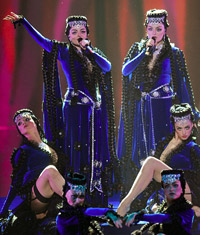When we try to examine the info sheet of cultural events then we immediately notice the abundance of competitions. In our days the question of “who’s the best; who’s the first or last?” is much signified. They compete to fill in new levels and lists. The competition format is not only a profitable one but also a good way for relieving stress because it allows withdrawing the aggression accumulated in a person (singer, filmmaker, state). The smart people would say get rid of the aggression and convert it into creative energy. Both creative and sports competitions have almost global importance. No not only individuals compete but also states and ideologies. The collision of ideals easily substitutes bloody wars. Do you want to know who’s stronger? Look, how we organize competitions and how we represent ourselves. The European singing competition becomes tenser and openly demonstrates competition of power and abilities. The Eurovision competition, which takes place in Moscow, showed the new ideology of the Russian Federation. And the bearer of that ideology became Russian famous band Tattoo with its “No one can overtake us” (Íàñ íå äîãîíÿò) song. The young and sexy girls sing that no one can be better than them and that they are on the first line (it’s not that important what line it is) and under the ceiling of the humongous concert hall “Olimpiski” fly pink military jets and the military orchestra blasts its music. The Russian national elements – bears, kettles and the dance of Kazaks are only entourage. The most important is the militaristic spirit, by which Russia wants to demonstrate its power to the world. And when the academic chorus of Alexandrov gets on stage Russia shows that it can also be in the first in a different format and that Russia remains undefeatable. In general, this song of Tattoo, which is heard at different occasions in different countries is gradually becoming the unofficial anthem of Russia and thus enjoys massive popularity. By taking very cunning steps the Russians were able to reconcile their dreams with a quite weak singing competition. On the two semi-final days of the competition several Russian words could be seen in monitors in Latin letters (borsh, kosmos, krasota, balalaika, vsego dobrogo, sneg) and the anchor of the competition Inna Churikova was proudly saying that Europe learned another Russian word and that the Europeans are going to need Russian words very much. Moreover, the Russian transcription of the words was showed in a larger format than the English translation. The slogan of this year’s Eurovision was to seek the Russian path and the glory. Even during the presentation of the dance of the Armenian singers Inga and Anoush Arshakyans the Russian emphasized that their dance was staged by Miguel, who works in Russia. By that they want to emphasize their talent by saying that they even help the Armenians. During the Eurovision of this year everything is well-thought and organized. The Russians would emphasize that they are powerful but there is no need to be afraid of them but it’s worth being ware. And this is exactly the official cultural policy of Russia, which is tightly linked with geopolitical processes and Russia’s attitude in that regard. On these days of the Eurovision the guests of Moscow are offered to get acquainted not only to the Russian cuisine (black caviar, rolls, pancakes and vodka) but also the songs and symbols of the Cold War era. During the receptions organized for the European guests they put on tables beverages with a 40 degree alcohol named “Snow queen”, lots of honey that flows and offered them the eloquent and patriotic speeches of various Russian statesmen. Luzhkov, for example, didn’t forget to mention that Russia has wealthy natural resources – oil, gas, etc. Europe shouldn’t forget about that even at moments when they eat black caviar with spoons.

